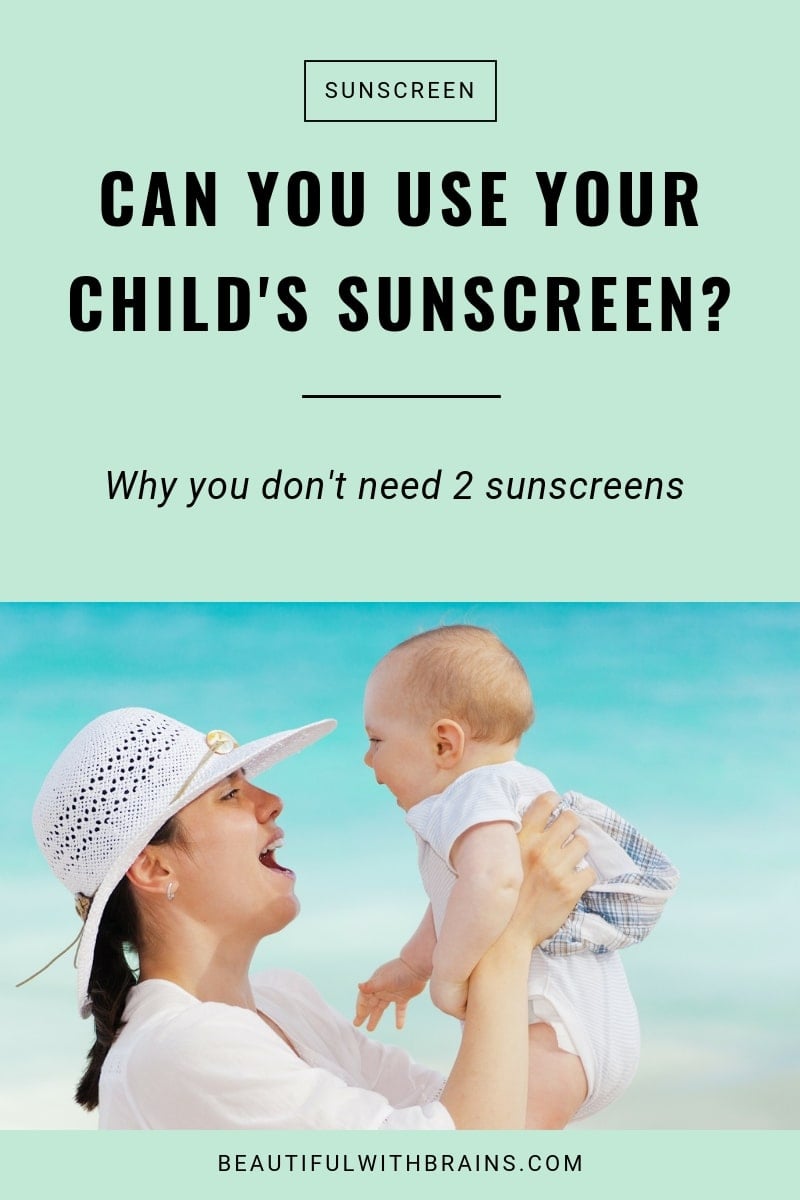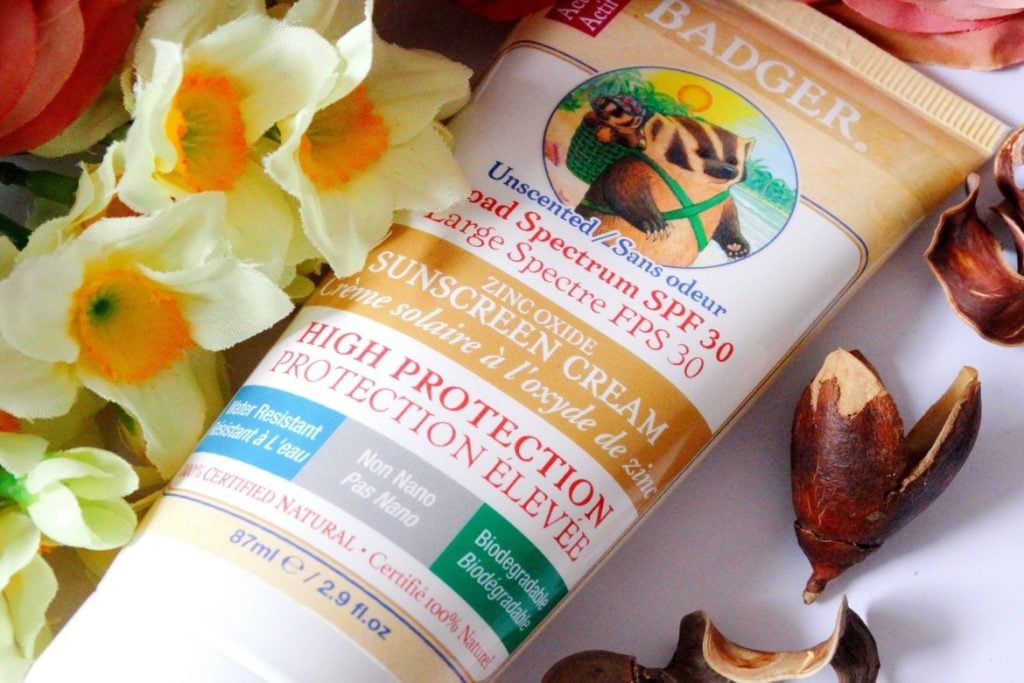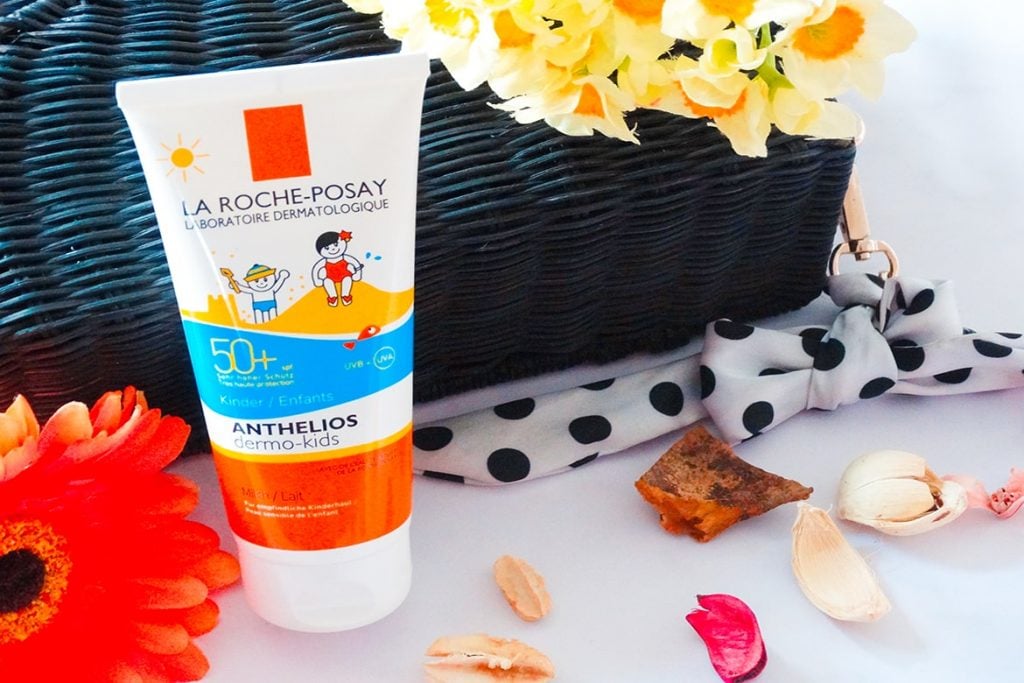
Are you buying two bottles of sunscreen, one for you and one for your children?
Stop. You’re just paying money twice for the SAME thing.
“But, Gio,” I hear you ask, “children’s skin is way more delicate than mine. Surely, they need their own sunscreen?”
Yes and no. It’s true that some UV filters aren’t child-friendly. But they can sneak their way into sunscreens marketed to children, too.
The only way to make sure that your sunscreen is child-friendly is to read the label. Once you find a gem, you can use it on all the family.
Let’s separate sunscreen truth from marketing fiction, shall we?
Sunscreen Truth: All UV Filters Are The Same…
It doesn’t matter if a sunscreen is marketed for children or for adults, the UV filters at a chemist’s disposal are exactly the same.
Or, said in a different way, there aren’t UV filters that are allowed only in sunscreens for adults and others that can be used only in children’s sunscreens. The same UV filters are used in ANY sunscreens.
You’ll find two types of UV filters in skincare:
- Mineral UV Filters: Zinc Oxide and Titanium Dioxide are two white minerals that provide broad spectrum protection without irritating even the most sensitive of skin types.
- Synthetic UV filters: All other UV filters – Avebenzone, Octinoxate, Oxybenzone, etc – provide protection from just one type of UV. You need to use several in a sunscreen to get adequate sun protection. They also tend to be more irritating. If you’ve got a bad reaction to sunscreen, one of them is usually the culprit.
For a complete list of UV filters used in sunscreen, click her.
Related: Mineral VS Chemical Sunscreen: Which One Is Better?
How effective is your sunscreen? Sign up to the newsletter below to receive the “Sunscreen Audit” Worksheet and find out if your sunscreen is really up to the job:
…But Not All Should Be Used In Children’s Sunscreens
Children’s skin is thinner than adults’ skin. This makes their skin more delicate and sensitive.
Chemical UV filters like Avobenzone are commonly known to trigger allergic reactions and allergies in people with sensitive skin. If you’re looking for a sunscreen for your child, it makes sense to avoid them.
There’s also another reason to avoid Avobenzone and Oxybenzone. They can penetrate your body. This isn’t necessarily dangerous. Your body can usually get rid of that little amount of UV filter that gets through the skin.
But, there are no studies done on children (for obvious reasons). Because we don’t know how well their little bodies can cope with these chemical UV filters, a lot of dermatologists recommend you err on the safe side and don’t use them on children.
Remember: a healthy adult body is fully equipped to deal with all kinds of toxins (pollutants, pesticides, and whatever else enters your body). Your liver and kidney get rid of them, as long as their amount isn’t too high.
But children’s in-built detoxifying system isn’t fully developed, yet. You need to be more careful with what you use on their skin.
Related: Is Avobenzone Safe For Children?

What UV Filters Are Children-Friendly?
There are two I recommend: Zinc Oxide and Titanium Dioxide.
These white minerals are too big to penetrate the skin and are so gentle, they very rarely cause irritations. That’s why they’re the safest choice for sensitive skin and children.
The catch? They tend to leave a white cast behind, but that’s a small price to pay for effective sun protection, don’t you think?
WARNING! While Zinc Oxide protects, on its own, from the entire UV range, Titanium Dioxide doesn’t. You can use a sunscreen with only Zinc Oxide, but not one with only Titanium Dioxide.
Related: 3 Reasons Why Mineral Sunscreen Is Better For Sensitive Skin

Marketing Fiction: Adults’ And Children’s Sunscreens Are Different
In a perfect world, all children’s sunscreens would contain only Zinc Oxide and Titanium Dioxide.
We don’t live in a perfect world.
Some brands do bother to use only UV filters (and other ingredients) that are gentle and sensitive-skin friendly. Others don’t really care and keep using chemical filters (usually to avoid the white cast) and common allergens (like fragrances).
You simply can’t tell by looking at a bottle of sunscreen marketed at children if it really is safe for children.
The only way to be safe is to read the label. I know it sounds daunting, but regulations here help. The law dictates that UV filters need to be stated separately from the other ingredients. If you don’t see only Zinc Oxide and Titanium Dioxide on the label, leave it on the shelf.
If it fits the bill, slather it on all the family. Zinc Oxide and Titanium Dioxide work well for young and old alike. Why pay twice for a separate adult sunscreen when your child’s will do the job just as well?
What Are The Best Sunscreens For Children AND Adults?
Here are my faves:
- Badger Balm Zinc Oxide Sunscreen Cream SPF 30 Unscented ($42.00): 18.75% zinc oxide + natural extracts. Available at iHerb.
- EltaMD UV Pure Broad Spectrum SPF 47 ($24.50): 10% zinc oxide + 5.5% titanium dioxide + water-resistant technology + dry finish for oily skin. Available at Dermstore and Walmart.
- Shiseido Ultimate Sun Protection SPF 50 Sunscreen + WetForce For Sensitive Skin & Children ($42.00): 9.1% titanium dioxide + 19.3% zinc oxide. Available at Nordstrom, Sephora and Ulta.
The Bottom Line
Ignore the marketing and look at the label. If the sunscreen is free of chemical filters, fragrances and common allergens, it can be used by all the family.
Have you every used children’s sunscreens? Share your experience in the comments below.


Very informative post! 🙂 I once used an all-over child sunscreen that irritated my skin. It was nothing too bad, but it tingled/stung my face a little bit. So I definitely agree that it really comes down to the ingredients, and not what’s on the label.
Makeup Morsels, I’m sorry to hear that. Children sunscreens should be formulated to be as gentle as possible but sadly that’s not always the case. That’s why it’s important to look at the ingredients and see if the sunscreen we use is really both broad spectrum and gentle. 🙂
Makeup Morsels, You should put kids sunscreen on for your own safety.
good write gio 😉 i have seen infants/children’s skincare too, and i really thought other than sunscreen , the rest is really quite unnecessary =/
Xin, thank you and I agree with you. 🙂
I used kids’ sunscreens before and got rashes. The formulation is slightly different and the lasting power is not the same. Since then, I’ve switched to adult version of physical sunblock and I no longer have rashes.
Dao, I’m sorry children sunscreens gave you so many problems! But I think it depends more on the particular products you were using cos there are some children sunscreens that are gentle and longlasting and others that contain harsh substances and don’t last long.. I’m glad the adult version works well for you. 🙂
Hi DAO
I put kids sunscreen on in February 2017 and it’s better than getting sunburnt.
Like this post! I’ve never used children’s sunscreen, so I can’t make any comment on its effectiveness. But I’ve got something in mind. Sunscreen, given that it offers broad spectrum protection to our skin, should be in and of itself anti-aging, right? Anything added to it that claims to be anti-aging would be bonus for me (I won’t expect my sunscreen to remove wrinkles on my face 🙂 If my sunscreen provides UVA and UVB protection and is not drying/oily or leaves a white cast, I am all satisfied.
Amanda, I’m glad you do. And yes, sunscreen is most effective anti-aging product and, if used daily and applied properly, it can prevent signs of premature aging and makes us look younger for longer. If it contains antioxidants, then it’s bonus, I agree with you, but as long as a sunscreen works well I don’t really care whether it contains them or not.
Yup, I have! I just look at the ingredients when I buy sunscreen and see if I like the smell.
Janessa, that’s a very smart way to shop for sunscreen.
I put kids sunscreen on in February and it’s better than getting fucken sunburnt.
Melanie, I couldn’t agree more!
Hi! I’m 22 and I have fair sensitive skin. I use Laboratoire de Biarritz face sunscreen and it is very good, but I have very delicate skin. Do you think I should switch to kids sunscreen for my face?
Mirzana, kids sunscreens aren’t necessarily safer. A lot of them contain ingredients that are irritating. It’s not about the label (kids/adults), it’s about the formula. If your current sunscreen works fine for you, I don’t see any reason to change.
Is it safe to use a body-face formula on the face (like the La Roche-Posay one on the picture)? Or is it better to use a face sunscreen?
Fiona, body sunscreen may have a thicker texture, but if you’re not acne-prone, you shouldn’t have any issue with it.